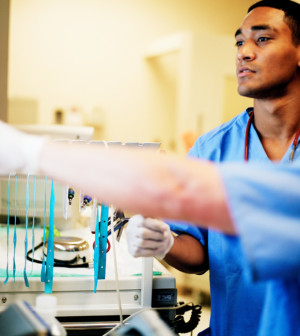- Double Mastectomy May Offer No Survival Benefit to Women With Breast Cancer
- Toxic Lead Found in Cinnamon Product, FDA Says
- Certain Abbott Blood Sugar Monitors May Give Incorrect Readings
- Athletes Can Expect High Ozone, Pollen Counts for Paris Olympics
- Fake Oxycontin Pills Widespread and Potentially Deadly: Report
- Shingles Vaccine Could Lower Dementia Risk
- Your Odds for Accidental Gun Death Rise Greatly in Certain States
- Kids From Poorer Families Less Likely to Survive Cancer
- Tough Workouts Won’t Trigger Cardiac Arrest in Folks With Long QT Syndrome
- At-Home Colon Cancer Test Can Save Lives
Health Highlights: Dec. 3, 2013


Here are some of the latest health and medical news developments, compiled by the editors of HealthDay:
Obama Announces $100 Million HIV Research Program
A $100 million National Institutes of Health initiative to pursue a cure for HIV was announced Monday by President Barack Obama.
He said the money will be used to develop a new generation of therapies, and also said the U.S. should be a leader in research to eliminate HIV or to force it into remission without the need for lifelong therapy, the Associated Press reported.
Obama made the announcement at a White House event marking World AIDS Day, which was Sunday.
He also said the U.S. had passed the goal he set last year to support 6 million HIV patients worldwide in getting access to anti-retroviral drugs. So far, the U.S. had helped 6.7 million people receive the life-saving treatment, the AP reported.
—–
First Human Case of H7N9 Bird Flu Reported in Hong Kong
Hong Kong has reported its first human case of H7N9 bird flu.
The patient is a 36-year-old Indonesian maid who is in hospital in critical condition, according to Hong Kong Health Secretary Ko Wing-man, the Associated Press reported.
The maid was known to cross the border to the mainland Chinese city of Shenzhen to buy, slaughter and eat chickens, said Ko, who added that Hong Kong will step up its flu pandemic preparedness plan.
The H7N9 virus was first identified in mainland China in April and has since sickened 139 people and killed 45 in China and Taiwan. The spread of the virus appears to have stalled since Chinese authorities cracked down on live animal markets, the AP reported.
Even so, experts fear the virus will re-emerge this winter.
—–
4th Meningitis Case Confirmed at California University
Another case of meningitis has been confirmed at the University of California, Santa Barbara and public health officials have urged the school to suspend parties and other social events on the campus.
The 18-year-old male student was the fourth case at UCSB in a month. One student has been left permanently disabled, NBC News reported.
The B strain of meningitis has been confirmed as the cause of three of the cases. The strain in the latest case still needs to be confirmed. The B strain of meningitis is not covered by the vaccine recommend for U.S. college students.
Princeton University in New Jersey has been hit by an outbreak of meningitis B, but it has a different genetic fingerprint than the strain in the UCSB cases, according to the Centers for Disease Control and Prevention, NBC News reported.
—–
U.S. Bishops Face Lawsuit Over Catholic Hospitals’ Abortion Policies
A lawsuit filed Friday against the United States Conference of Catholic Bishops says the group’s anti-abortion orders to Catholic hospitals prevent proper care of pregnant women in medical distress, leading to medical negligence.
The suit was filed by the American Civil Liberties Union on behalf of a woman who says she was not given accurate information or care at a Catholic hospital in Michigan after her water broke at 18 weeks of pregnancy, The New York Times reported.
As a result of this failure by staff at Mercy Health Partners in Muskegon, Tamesha Means says she was exposed to dangerous infections. The suit alleges that the bishops’ ethical and religious directives require Catholic hospitals to avoid abortions or referrals “even when doing so places a woman’s health or life at risk.”
The ACLU said it launched legal action against the bishops because there have been several cases in recent years in which Catholic hospital policies on abortion interfered with medical care, The Times reported.
Both the hospital and the bishops conference refused comment.
An advisor to the bishops could not speak about the ACLU lawsuit because he was unfamiliar with it. But John Haas, president of the National Catholics Bioethics Center in Philadelphia, told The Times that the bishops’ directives do allow actions to treat women at risk, even if the treatment might cause the loss of the fetus.
Copyright © 2024 HealthDay. All rights reserved.










